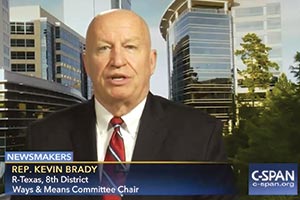Senior Reporter
New Congress Expected to Take On Infrastructure Funding, Tax Reform

This story appears in the Jan. 2 print edition of Transport Topics.
A push to reform corporate tax laws by the Republican leadership of the House and Senate could help carve a path for the Trump administration to advance an infrastructure funding proposal in the coming months, Rep. Kevin Brady, the top tax writer in the House, told reporters before the start of the new Congress.
Brady (R-Texas), chairman of the Ways and Means Committee, said he would look to include President-elect Donald Trump’s pledge to invest $1 trillion over the next 10 years through tax credits as part of a tax overhaul measure.
Republican leaders, who will kick off the 115th Congress on Jan. 3, said they have held talks with members of Trump’s tax and transportation teams to identify the best approaches for boosting dollars for repairing crumbling roads and bridges. In 2013, a national group of engineers gave the country’s infrastructure a near-failing grade.
“They are moving quickly on a lot of fronts, from tax reform and health care and trade, and on infrastructure as well,” Brady said on C-SPAN’s Dec. 16 Newsmakers program.
“We’re intersecting with them in a number of areas,” the chairman said. “I am really encouraged by the direction that we are all going together in.”
Pushing a tax reform package might identify funding options for stabilizing the federal Highway Trust Fund. The fund, which the Department of Transportation uses to help states pay for infrastructure, is projected to run low on cash within four years. Brady’s panel is responsible for feeding the fund.
Key transportation stakeholders, including American Trucking Associations, have called on Congress to raise fuel taxes to prop up the trust fund. Senate Finance Chairman Orrin Hatch (R-Utah), Brady and other Republican leaders have opposed raising fuel taxes.
During an interview on ABC News’ “Powerhouse Politics” podcast, Sen. Charles Schumer of New York, the top Democrat in the new Senate, stressed a willingness to work with the Trump administration on infrastructure.
However, Schumer has called for lowering tax rates on repatriated U.S. corporate profits to draw back money from overseas to help pay for infrastructure projects, instead of Trump’s idea of providing tax breaks to help businesses privatize large-scale infrastructure projects.
Hatch, Brady’s Senate counterpart, has yet to endorse lowering the tax rate on repatriated income as an infrastructure funding tool.
Senate Majority Leader Mitch McConnell (R-Ky.) said that he would proceed with confirming Trump’s Cabinet nominees and repealing the Affordable Care Act before tackling infrastructure.
Meanwhile, the chairman of the House Transportation and Infrastructure Committee, Rep. Bill Shuster (R-Pa.), indicated he would press ahead with an aviation reauthorization bill in the next few weeks. Shuster and other transportation policymakers have not said if the reauthorization would include a pre-emption of a meal and rest-break rule affecting trucking.
Shuster sought to include the pre-emption in the aviation measure last year. The current Federal Aviation Administration authorization expires Sept. 30.
ATA’s leadership expressed optimism that Congress will advance the meal and rest-break pre-emption during the new Congress. The aviation reauthorization or a funding bill that would keep the federal government operating after April 28 would be two legislative vehicles to which to attach the provision.
“ATA is actively working with House and Senate leaders, appropriators and coalition partners to advance this priority,” the group wrote in a note to its members in December.
A pre-emption provision would clarify a requirement in a 1994 aviation law, popularly known as F4A, to block a California law enacted in 2011. That law requires employers to provide a 30-minute meal break for employees who work more than five hours a day, as well as a second 30-minute meal break for those who work more than 10 hours a day.
Trucking has argued that vehicle operators are properly regulated by the Transportation Department’s hours-of-service rule for drivers.

